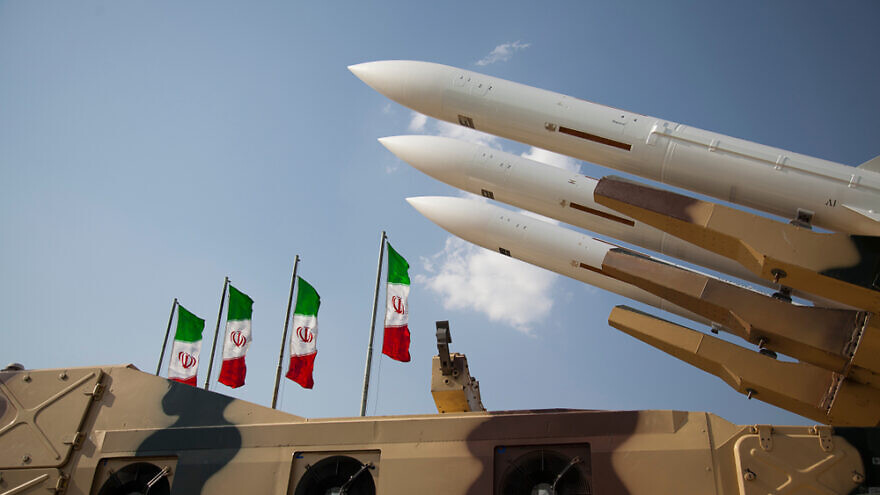Nine months after the U.N. arms embargo on Iran has expired, there has not been a major new trend of sales of international arms to the Islamic Republic so far.
Yet a potential danger remains of Iran seeking to purchase fighter jets, advanced missile defenses and anti-ship missiles from Russia in the future, a former Israeli defense official has told JNS.
In reality, Iran remains the prime cause of destabilization and radicalism in the region, nourishing its network of armed proxies with weapons that are produced by its increasingly sophisticated domestic-weapons industry.
Evental served as the former head of the Strategic Planning Unit of the Political-Military and Policy Bureau at the Israeli Defense Ministry, as well as Israel’s intelligence attaché in Washington.
In September 2020, the Trump administration snapped back all of the sanctions that the United Nations had imposed on Iran, including the arms embargo. In February 2021, the Biden administration, for its part, said it was canceling the snapback sanctions, but it never declared that it was recognizing the lifting of the arms embargo, noted Evental.
“The U.S. has resisted lifting its own embargo,” said Evental. “America has not recognized the end of the arms embargo on Iran.”
“Since then, the Americans have not really dealt with the issue, but the U.S. has not canceled secondary sanctions against all states that sell arms to Iran,” he noted.
The issue has turned into a legal dispute in the United Nations, and America’s isolated position on the matter has meant that it refrains from publicly discussing it.
In June, when reports of Iranian warships heading to Venezuela with weapons on-board surfaced, the United States applied major pressure to disrupt the transfer, said Evental, describing the development as a de facto arms embargo, which bans both Iranian weapons exports and imports.
As a result of Washington’s position, in the past nine months there has been no major visible movement of Iranian weapons purchases, he added.
Another factor that seems to be holding up Iranian arms acquisitions is Iran’s own difficult economic situation, which means that it is unclear how able it is to afford major purchases and pay suppliers on time.
The European Union and the United Kingdom have their own separate arms export embargos on Iran—banning the sales of weapons, including missiles—in place until 2023.
According to Evental, Western states are deterred by Iran’s illegal conduct around the region and gross violation of other U.N. Security Council, such as 1701, which bans weapons supplies to Hezbollah in Southern Lebanon—an area already brimming with Iranian-supplied weapons, including attempts to construct precision-guided missiles.
U.N. Security Council Resolution 2216, which bans weapons transfers to the Houthis in Yemen, is another resolution trampled by Iran with impunity. Iran also supplies its radical Shi’ite militias in Iraq with an array of weapons.
‘Three weapons systems that would generate concern’
Evental noted that Russia’s willingness to supply Iran with weapons is the most significant test of the past nine months that followed the lifting of the embargo.
While Russia has said it is willing to export arms to Tehran, “in reality, we haven’t seen big contracts,” he said. Any big contract “should have been on the table, since Russia has been the element that expressed the most support for the lifting of the embargo.”
The reasons for this include the fact that Russia’s own defense export sector has been under American sanctions since Moscow’s 2014 invasion of Crimea. “Every state that purchases Russian arms or is in deep ties with its defense sector is sanctioned. This happened to Turkey, which purchased the Russian S-400 air-defense system. It could happen to the Egyptians if they proceed with reported intentions to purchase the Sokhoi-35 fighter jet,” explained Evental.
With the Russian defense sector also facing American sanctions, Russia is likely not keen to publicize any talks with Iran about selling weapons in such an environment.
In addition, Russia wants the Vienna nuclear talks between world powers and Iran to end with an agreement, said Evental, and “selling offensive or threatening weapons could create disruptive tensions and undermine this wish.”
In June, reports surfaced that Russia was preparing to supply Iran with an advanced spy satellite. The United States released detailed messages on the sale, though Russian President Vladimir Putin dismissed the reports as fake news.
“The Russians are hiding their activities,” concluded Evental, adding that it’s possible that smaller deals with Iran are taking place, such as for the sale of parts, equipment and technology.
From Israel’s perspective, there are three main weapons systems that would generate concern if they became the subject of sales from Russia. The first is the S-400 air-defense system, which Evental described as strategic, as it could provide the Iranians with a sense of immunity and increase their nuclear activities under the cover of advanced air defenses over nuclear sites.
The Yakhont supersonic anti-ship missile, which has a range of hundreds of kilometers, also forms a strategic threat because of how the Iranians could use it to threaten Israeli shipping around the region, cautioned Evental.
Fighter jets form the third central concern purchase for Israel. “Today, Iran can’t reach Israel with planes. If they acquire advanced Russian jets, such as the ones that Moscow wants to sell Egypt, that could form a problem as Iran could deploy the planes in all sorts of places in the region,” he said. “For Israel, this would be a threatening wish list.”
Still, he stressed, so far, there are no indications that such sales are going ahead.


























